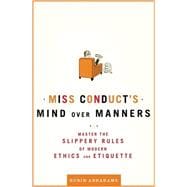
Note: Supplemental materials are not guaranteed with Rental or Used book purchases.
Purchase Benefits
What is included with this book?
Robin Abrahams is the “Miss Conduct” columnist for The Boston Globe Sunday Magazine and writes the “Socially Scientific” column for the science humor magazine Annals of Improbable Research. A research associate at Harvard Business School, she has also worked as a stand-up comedian and holds a doctorate in psychology. She and her husband, Marc Abrahams, the founder of the Ig Nobel Prizes, live in Cambridge, Massachusetts.
| Introduction: Welcome to the Real World of Etiquette | p. 1 |
| You Are What You Eat: Food | p. 15 |
| Mad (About) Money: Finances | p. 41 |
| Happy Holidays: Religion | p. 74 |
| She Said, He Said: Sex and Relationships | p. 106 |
| Mother, May I?: Children | p. 142 |
| Private Parts: Health | p. 170 |
| The Best Friend: Pets (and Other Passions) | p. 196 |
| Conclusion: The Principles of Thoughtful Engagement | p. 219 |
| A Note to the Reader | p. 245 |
| Appendix: Recipes for the Soul | p. 247 |
| Bibliography: Improve Your Mind over Manners | p. 251 |
| Acknowledgments | p. 255 |
| Index | p. 259 |
| Table of Contents provided by Ingram. All Rights Reserved. |
The New copy of this book will include any supplemental materials advertised. Please check the title of the book to determine if it should include any access cards, study guides, lab manuals, CDs, etc.
The Used, Rental and eBook copies of this book are not guaranteed to include any supplemental materials. Typically, only the book itself is included. This is true even if the title states it includes any access cards, study guides, lab manuals, CDs, etc.